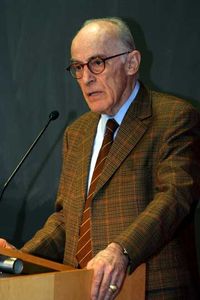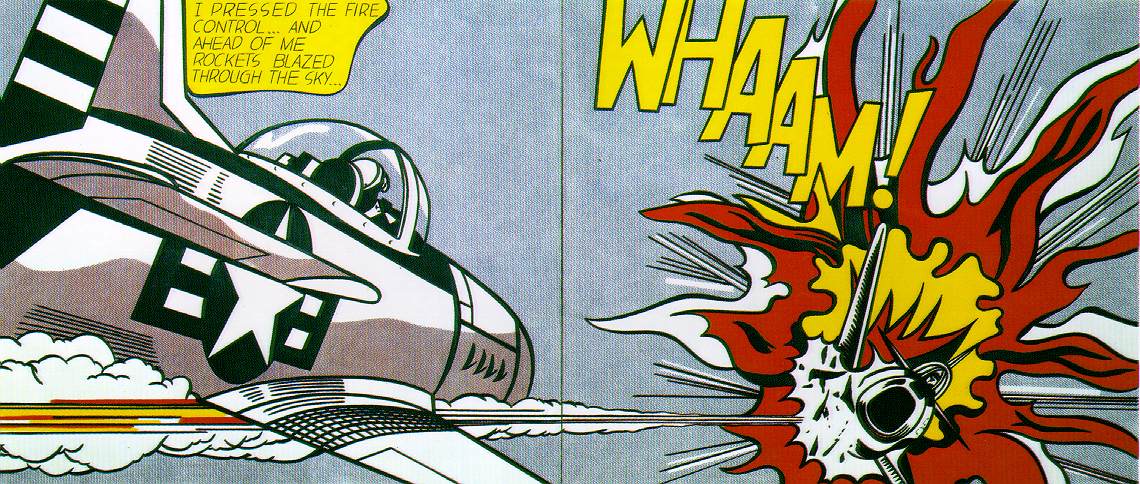þri. 13.2.2007
Íraksstríðið tapað... tími til að finna sér ný stríð!
 William Odom, yfirmaður Þjóðaröryggisráðs Ronald Reagan skrifaði langa grein í sunnudagsútgáfu Washington Post þar sem hann bendir á að þar sem Bush sé búinn að skíttapa stríðinu í Írak sé kominn tími til að leita nýrra leiða. Grein Odom er bæði skynsamleg og vel skrifuð, og niðurstaða hans, að Bandaríkin þurfi að horfast í augu við að stríðið sé tapað, getur varla verið gleðifréttir fyrir forseta sem virðist ímynda sér að hann sé einhverskonar arftaki Reagan. Odom hrekur öll rök sem borin hafa verið á borð til að réttlæta áframhald stríðsins, og kallar á þingið að stöðva stríðsrekstur Bush. Það sé alls ekki nóg að samþykkja einhverjar "nonbinding resolutions".
William Odom, yfirmaður Þjóðaröryggisráðs Ronald Reagan skrifaði langa grein í sunnudagsútgáfu Washington Post þar sem hann bendir á að þar sem Bush sé búinn að skíttapa stríðinu í Írak sé kominn tími til að leita nýrra leiða. Grein Odom er bæði skynsamleg og vel skrifuð, og niðurstaða hans, að Bandaríkin þurfi að horfast í augu við að stríðið sé tapað, getur varla verið gleðifréttir fyrir forseta sem virðist ímynda sér að hann sé einhverskonar arftaki Reagan. Odom hrekur öll rök sem borin hafa verið á borð til að réttlæta áframhald stríðsins, og kallar á þingið að stöðva stríðsrekstur Bush. Það sé alls ekki nóg að samþykkja einhverjar "nonbinding resolutions".
The public awakened to the reality of failure in Iraq last year and turned the Republicans out of control of Congress to wake it up. But a majority of its members are still asleep, or only half-awake to their new writ to end the war soon.
Perhaps this is not surprising. Americans do not warm to defeat or failure, and our politicians are famously reluctant to admit their own responsibility for anything resembling those un-American outcomes. So they beat around the bush, wringing hands and debating "nonbinding resolutions" that oppose the president's plan to increase the number of U.S. troops in Iraq.
Odom heldur því fram að utanríkisstefna forsetans felist í "[a] relentless pursuit of defeat", og sé byggð á "illusions, not realities", sem ég held að sé einhver besta lýsing á þessari utanríkisstefnu sem ég hef séð. Odom svarar þvínæst helstu rökum þeirra sem halda að það sé góð hugmynd að halda áfram að sökkva skattfé og mannslífum í þetta tapaða stríð:
1) We must continue the war to prevent the terrible aftermath that will occur if our forces are withdrawn soon. Reflect on the double-think of this formulation. We are now fighting to prevent what our invasion made inevitable! Undoubtedly we will leave a mess -- the mess we created, which has become worse each year we have remained. Lawmakers gravely proclaim their opposition to the war, but in the next breath express fear that quitting it will leave a blood bath, a civil war, a terrorist haven, a "failed state," or some other horror. But this "aftermath" is already upon us; a prolonged U.S. occupation cannot prevent what already exists.
2) We must continue the war to prevent Iran's influence from growing in Iraq. This is another absurd notion. One of the president's initial war aims, the creation of a democracy in Iraq, ensured increased Iranian influence, both in Iraq and the region. Electoral democracy, predictably, would put Shiite groups in power -- groups supported by Iran since Saddam Hussein repressed them in 1991. Why are so many members of Congress swallowing the claim that prolonging the war is now supposed to prevent precisely what starting the war inexorably and predictably caused? Fear that Congress will confront this contradiction helps explain the administration and neocon drumbeat we now hear for expanding the war to Iran.
Here we see shades of the Nixon-Kissinger strategy in Vietnam: widen the war into Cambodia and Laos. Only this time, the adverse consequences would be far greater. Iran's ability to hurt U.S. forces in Iraq are not trivial. And the anti-American backlash in the region would be larger, and have more lasting consequences.
3) We must prevent the emergence of a new haven for al-Qaeda in Iraq. But it was the U.S. invasion that opened Iraq's doors to al-Qaeda. The longer U.S. forces have remained there, the stronger al-Qaeda has become. Yet its strength within the Kurdish and Shiite areas is trivial. After a U.S. withdrawal, it will probably play a continuing role in helping the Sunni groups against the Shiites and the Kurds. Whether such foreign elements could remain or thrive in Iraq after the resolution of civil war is open to question. Meanwhile, continuing the war will not push al-Qaeda outside Iraq. On the contrary, the American presence is the glue that holds al-Qaeda there now.
4) We must continue to fight in order to "support the troops." This argument effectively paralyzes almost all members of Congress. Lawmakers proclaim in grave tones a litany of problems in Iraq sufficient to justify a rapid pullout. Then they reject that logical conclusion, insisting we cannot do so because we must support the troops. Has anybody asked the troops?
During their first tours, most may well have favored "staying the course" -- whatever that meant to them -- but now in their second, third and fourth tours, many are changing their minds. We see evidence of that in the many news stories about unhappy troops being sent back to Iraq. Veterans groups are beginning to make public the case for bringing them home. Soldiers and officers in Iraq are speaking out critically to reporters on the ground.
But the strangest aspect of this rationale for continuing the war is the implication that the troops are somehow responsible for deciding to continue the president's course. That political and moral responsibility belongs to the president, not the troops. Did not President Harry S. Truman make it clear that "the buck stops" in the Oval Office? If the president keeps dodging it, where does it stop? With Congress?
En meðan Odom telur að lausnin á ófremdarástandinu fyrir botni Persaflóa sé að leita eftir samstarfi við önnur ríki á svæðinu virðast Cheney og Bush vera önnun kafnir við að undirbúa stríð við Íran! Odom heldur því fram að ef Bush sé annt um orðstír sinn ætti hann að stilla til friðar og draga herlið Bandaríkjanna heim:
If Bush truly wanted to rescue something of his historical legacy, he would seize the initiative to implement this kind of strategy. He would eventually be held up as a leader capable of reversing direction by turning an imminent, tragic defeat into strategic recovery.
Bush virðist hins vegar staðráðinn í að verða minnst sem allra lélegasta og forseta fyrr og síðar. Honum hefur þegar tekist að endurreisa orðstír Nixon, sem í samanburði við Bush virðist nánast holdgerfingur skynseminnar. Og til að tryggja þennan orðstír er eitt misheppnað stríð ekki nóg! Það þarf tvö!
M
ps - meðan ég var að leita að upplýsingum um Odom rakst ég á fyrirlestur sem hann flutti hjá The Watson Institute For International Studies, sem er helvíti góður. (Sjá hér - það er bæði hægt að hlusta á fyrirlesturinn í mp3 og horfa á upptöku af honum.) Odom færir nokkuð góð rök fyrir því að Bush sé langt kominn með að eyðileggja "The American Empire", sem Odom finnst auðvitað hið versta mál.
Meginflokkur: Írak | Aukaflokkar: Bush, Stjórnmál og samfélag | Facebook


Athugasemdir
Rödd hrópandans í eyðimörkinni. Það er þó einhver glóra til þarna vestanhafs. Verður hann ekki kallaður svikari og landráðamaður? Sagði "the burning Bush" ekki að þeir sem ekki væru með væru á móti? Andamerískir?
Jón Steinar Ragnarsson, 13.2.2007 kl. 03:11
Bæta við athugasemd [Innskráning]
Ekki er lengur hægt að skrifa athugasemdir við færsluna, þar sem tímamörk á athugasemdir eru liðin.